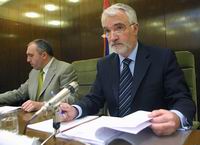- Serbia
Get to know Serbia
- Citizens
Culture and science
Health services
Pension and disability insurance
- Business
Employment
Economy
- Media
- Government
- Contact
Keep in touch
Contact form
Back
Keepin touch
Whether you have a question, comment, suggestion or any problem in the purview of the government, send us your message and we will try to respond as soon as possible. If your problem is not in our purview, we will forward your message to the relevant institution.
Q:
A:
Presidential election results to influence foreign investment
Belgrade,
28 May 2004
The results of the forthcoming presidential election will influence the inflow of foreign investment, Serbian Deputy Prime Minister Miroljub Labus told a meeting at the Serbian Chamber of Commerce yesterday.
Foreign companies will not invest in Serbia unless the country elects a democratic president, said Labus, adding that the state must also eliminate constitutional obstacles preventing foreign investors from purchasing land in Serbia.
He also called on local authorities to help attract and retain foreign invest, and noted that relevant international organisations are currently assessing Serbia’s creditworthiness.
Serbia would lose its preferential treatment in the European Union market it if increased customs duties, said Labus, stressing that the EU has allowed duty-free exports for nearly 97 percent of Serbian goods. In order to keep the preferential treatment of its goods, the country will have to introduce other measures to help local companies become competitive in the EU market, he added.
Serbia’s foreign trade gap widened 13 percent following trade liberalisation in 2001, the Deputy Prime Minister said, adding that the deficit rose a further 45 percent following the adoption of the Action Plan for economic harmonisation with Montenegro in 2003.
Serbia cannot reduce tariffs for 56 agricultural products, which it has yet to harmonise with Montenegro, said Labus, adding that the country has proposed a second solution to both Brussels and Montenegro.
He also called on local authorities to help attract and retain foreign invest, and noted that relevant international organisations are currently assessing Serbia’s creditworthiness.
Serbia would lose its preferential treatment in the European Union market it if increased customs duties, said Labus, stressing that the EU has allowed duty-free exports for nearly 97 percent of Serbian goods. In order to keep the preferential treatment of its goods, the country will have to introduce other measures to help local companies become competitive in the EU market, he added.
Serbia’s foreign trade gap widened 13 percent following trade liberalisation in 2001, the Deputy Prime Minister said, adding that the deficit rose a further 45 percent following the adoption of the Action Plan for economic harmonisation with Montenegro in 2003.
Serbia cannot reduce tariffs for 56 agricultural products, which it has yet to harmonise with Montenegro, said Labus, adding that the country has proposed a second solution to both Brussels and Montenegro.
-
 Belgrade, 18 November 2025
Belgrade, 18 November 2025Serbia remains committed to open dialogue, cooperation with OSCE
-
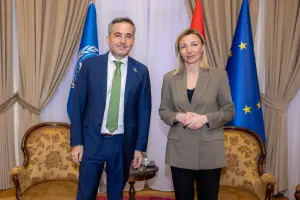 Belgrade, 18 November 2025
Belgrade, 18 November 2025Cooperation with WHO to strengthen protection for victims of violence
-
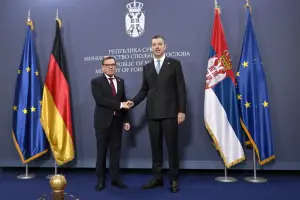 Belgrade, 18 November 2025
Belgrade, 18 November 2025Germany ready to accompany Serbia on its path towards EU
-
 Belgrade, 16 November 2025
Belgrade, 16 November 2025Solution for NIS must be found by next week
-
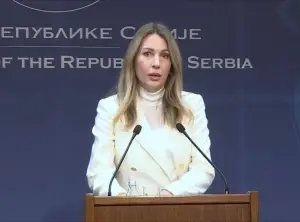 Belgrade, 15 November 2025
Belgrade, 15 November 2025United States sends request for Russian ownership to exit NIS
-
 Belgrade, 13 November 2025
Belgrade, 13 November 2025Serbia continues to be reliable partner of EU
-
 Belgrade, 13 November 2025
Belgrade, 13 November 2025European integration, preserving peace, stability priorities for Serbia
-
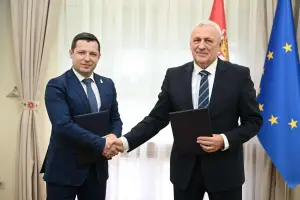 Belgrade, 13 November 2025
Belgrade, 13 November 2025Cooperation agreement signed for preparation of Specialised Expo 2027
-
 Belgrade/London, 12 November 2025
Belgrade/London, 12 November 2025Exchange of experiences with UK in field of women’s economic empowerment
-
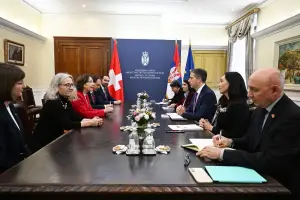 Belgrade, 12 November 2025
Belgrade, 12 November 2025Strengthening cooperation, partnership between Serbia, Switzerland

